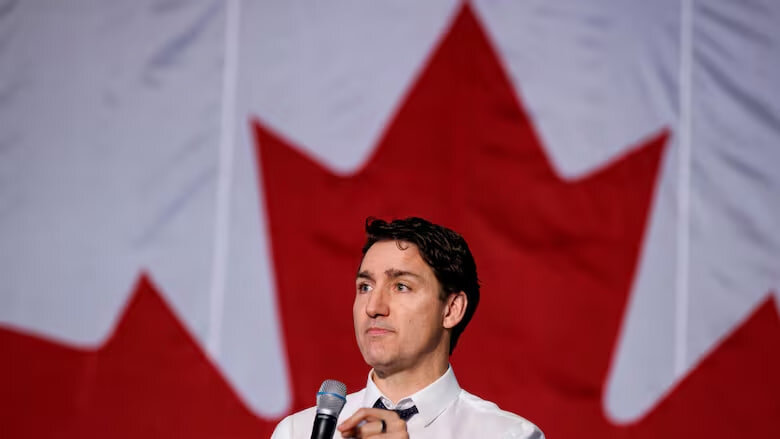INSUBCONTINENT EXCLUSIVE:
Earlier this week, it appeared as if the Trump administration was going to follow through on its threat to impose a sweeping 25 percent
tariff across the board on Canadian exports to the United States
announced a set of retaliatory tariffs, targeting $150 billion on an array of U.S
products, including appliances, machinery, and agricultural goods
to secure a 30-day pause on tariffs
(Mexico, which faced a similar threat from Trump, also won a reprieve.) In exchange, Trudeau offered a suite of measures to shore up the
Canadian border, including a variety of previously announced investments on increased manpower and surveillance capabilities aimed at
curbing illegal immigration and combating the flow of fentanyl.The pause is good news, especially for Canadians, who would have suffered
immediate economic harm had Trump followed through
But in other ways, the damage is already done
The treatment he has doled out to Canada is a harbinger of what is to come for U.S
allies in Europe and Asia
In recent days, Trump has chastised Taiwan for its trade surplus with the United States and warned the European Union that tariffs could be
In the short term, the most pragmatic approach for Canada (and other U.S
This is easier said than done, however, as domestic politics often incentivize responses driven by pride or nationalism
Canadians and others must resist the temptation to lash out
the primary tool of statecraft
Traditional diplomacy and alliance management are relegated to the sidelines in favor of an aggressive, protectionist agenda that
prioritizes immediate economic gains over long-term strategic stability
Although many American allies have become accustomed to criticism from Washington over trade imbalances and defense spending, Trump is the
allies, as inherently adversarial, requiring constant renegotiation under the threat of financial penalties
This approach creates uncertainty among U.S
But the long-term consequences of his economic belligerence have been largely negative for all involved
Steel and aluminum tariffs the Trump administration placed on Canada in 2018, for example, prompted retaliatory measures that harmed
American businesses and consumers while failing to yield significant strategic gains.Carrying out economic warfare on allies sows distrust
and risks fracturing the transatlantic and Indo-Pacific security architectures that have underpinned global stability for decades.The
fallout, however, goes far beyond the bottom line
Carrying out economic warfare on allies sows distrust and risks fracturing the transatlantic and Indo-Pacific security architectures that
have underpinned global stability for decades
Beijing, for example, is seeking to drive a deeper divide between the U.S
and Europe by presenting itself as a more reliable economic partner
For its part, Moscow is capitalizing on transatlantic tensions to weaken NATO cohesion
By undermining trust with allies through indiscriminate economic aggression, Washington risks isolating itself at a time when maintaining
counterproductive, but his broader critique of burden sharing is not without merit
military power as a security blanket
Canada is a clear example, with a defense budget hovering around 1.4 percent of GDP and a military that has been consistently malnourished
and unable to fulfill its obligations on continental security, let alone make sustainable contributions beyond
In the Indo-Pacific, key U.S
allies such as Japan have historically constrained their military spending and capabilities, despite facing direct threats from China and
more deeply than ever before, making it easier for any one of them to threaten their adversaries and for the broader collective to challenge
the U.S.-led rules-based order
This should be a wake-up call for U.S
allies to do more to bolster their own security
The era of guaranteed American military supremacy, capable of underwriting global stability at little cost to its partners, is over
an increasingly dangerous world
For Canada, this means considering national security and defense as top-line items, not budgeting
Ottawa needs to modernize its capabilities, particularly its naval assets and surveillance capacities in the Arctic, to demonstrate its
Other allies need to take similar steps
European countries must accelerate their efforts to modernize their militaries, enhance force readiness, and reduce their reliance on
In the Indo-Pacific, countries such as Australia, Japan, and South Korea must deepen security cooperation and build up their own forces to
ensure regional stability.The need for greater burden sharing extends beyond military spending
Allies must also strengthen economic resilience against coercion from hostile states, which goes beyond the kind of bullying Trump favors
allies must reduce their dependence on Chinese supply chains, diversify their energy sources, secure their critical infrastructure from
cyber and espionage threats, and coordinate their responses to economic pressure tactics used by Beijing and Moscow.Ottawa can start that
process by taking several key steps for its own security
First, while discussions with the Trump administration on trade and the border (particularly on combating the trafficking of fentanyl) will
boost defense spending to bolster its credibility in Washington
allies that they need to get creative when it comes to trade alignments and geopolitical positioning
For all of them, the United States remains an existential economic and security partner
But that does not preclude U.S
Washington at all.In an ideal world, the United States would encourage its allies to meet or exceed their defense commitments through
diplomatic engagement, security incentives, and joint investment in defense technologies rather than through punitive economic measures
That, however, is not the world Trump seeks to bring about
Canada is the first ally to get a taste of what he intends
But it will not be the last.(Source: Foreign Affairs)*********H

